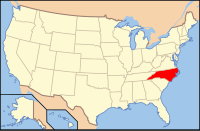Stanly County, NC
| Stanly County, North Carolina | ||
|---|---|---|

Stanly County Courthouse in Albemarle
|
||
|
||
 Location in the U.S. state of North Carolina |
||
 North Carolina's location in the U.S. |
||
| Founded | 1841 | |
| Named for | John Stanly | |
| Seat | Albemarle | |
| Largest city | Albemarle | |
| Area | ||
| • Total | 405 sq mi (1,049 km2) | |
| • Land | 395 sq mi (1,023 km2) | |
| • Water | 9.8 sq mi (25 km2), 2.4% | |
| Population | ||
| • (2010) | 60,585 | |
| • Density | 153/sq mi (59/km²) | |
| Congressional district | 8th | |
| Time zone | Eastern: UTC-5/-4 | |
| Website | www |
|
Stanly County is a county in the U.S. state of North Carolina. As of the 2010 census, the population was 60,585. Its county seat is Albemarle.
Stanly County comprises the Albemarle, NC Micropolitan Statistical Area, which is also included in the Charlotte-Concord, NC-South Carolina Combined Statistical Area.
The site of modern-day Stanly County was originally peopled by small tribes of hunter-gatherers and Mound Builders whose artifacts and settlements have been dated back nearly 10,000 years. Large-scale European settlement of the region came in the mid-18th century via two primary waves: immigrants of Dutch, Scots-Irish and German descent moved from Pennsylvania and New Jersey seeking enhanced religious and political tolerance, while immigrants of English backgrounds came to the region from Virginia and the Cape Fear River Basin in Eastern North Carolina.
In early English colonial times, the Stanly County area was politically part of the New Hanover Precinct, out of which the Bladen Precinct was created in 1734. The renamed Bladen County was subdivided to create Anson County in 1750, which in turn spawned Montgomery County in 1779.
Stanly County was formed in 1841 from the part of Montgomery County west of the Pee Dee River. It was named for John Stanly of New Bern (1774–1834), who served several terms in the North Carolina House of Commons and two terms (1801–1803, 1809–1811) in the United States House of Representatives.
...
Wikipedia

